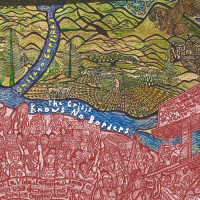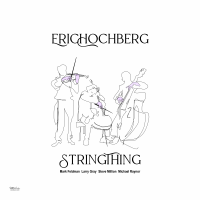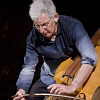Home » Jazz Musicians » Mark Feldman
Mark Feldman
After three albums with John Abercrombie--"Open Land", "Cat 'n' Mouse", and "Class Trip"--and the trio recording "Abaton" with Sylvie Courvoisier and Erik Friedlander, this is the first ECM leader date for violinist Mark Feldman.
Feldman is established now as one of jazz's finest string players, but "What Exit" frequently leaves 'jazz' behind, as his pieces--there are eight originals here - establish climates more frequently associated with contemporary composition. At the same time, interaction is paramount in this music and solo skills as crucial as ensemble awareness. Five years ago in an interview with the Boston Globe's Bob Blumenthal, Feldman spoke of his goal as "integration, without it being a frivolous 'crossover' thing--the real organic integration of classical and modern jazz." "What Exit" takes large steps toward the realisation of this ambition, which is itself the logical outcome of Feldman's idiosyncratic journey through the genres over the last thirty years.
He is joined on "What Exit", recorded at New York's Avatar Studio last year, by a special group of players assembled for the project--England's John Taylor on piano, the Swedish bassist Anders Jormin and drummer Tom Rainey, California-born but, like Feldman himself, long established as a central figure in New York's improvising circles. (Rainey makes his ECM debut on "What Exit".) Feldman's pieces maximise the improvising potential of each of the players, and it is immediately apparent that Rainey and Jormin are a provocative and mutually-inspiring rhythm team, providing enormous propulsion for the opening "Arcade", a 23-minute piece of ever-changing mood. Feldman's solos alone reference inspirations from raga to Bach's Chaconne to free play.
"Father Demo Square", a piece Feldman has previously recorded with both pianist Neal Kirkwood and drummer Billy Hart is a soulful ballad, "Ink Pin" a racing boppish tag game, while the jaunty title track is - we're told--a tribute to New Jersey... The demands of the material continually bring the soloists to new places. It is a broad terrain that Feldman traverses. The constant in his musical career has been change itself.
Feldman was already zigzagging between idioms in his late teens. He played in the Civic Orchestra of Chicago; the training orchestra affiliated with the Chicago Symphony, whose members included a number of significant jazz players, amongst them bassists Fred Hopkins and Steve Rodby, and earned pocket money playing Western swing and rockabilly on the weekends. He also took lessons in improvisation from local saxophone legend Joe Daley, a musician whose experience extended from bebop to the birth of the free (Daley's trio, with Hal Russell, had been one of the first American groups to improvise outside the changes).
Read moreTags
Gustavo Cortiñas: The Crisis Knows No Borders

by Hrayr Attarian
Drummer Gustavo Cortinas is one of Chicago's most imaginative and exciting composers. This is not solely due to his brilliant creativity but also because he explores socially aware and relevant themes. He has honed a unique style that is easily recognizable as his own. His sixth release as a leader, the superb The Crisis Knows No Border, is about the impact of human-made climate change. Cortinas leads his quartet through the 10 provocative and richly-textured, interlinked originals ...
Continue ReadingRuss Johnson Quartet: Reveal

by Troy Dostert
While he has appeared on seemingly countless releases as a sideman, trumpeter Russ Johnson remains chronically under-recorded as a leader. It thus comes as a cause for rejoicing whenever one sees his name at the top of a release. Thankfully, Calligram Records has helped redress that problem with Reveal, Johnson's latest offering featuring a quartet with violinist Mark Feldman, bassist Ethan Philion and drummer Timothy Daisy. Geof Bradfield and Chad McCullough started Calligram with an eye toward showcasing some of ...
Continue ReadingMark Feldman: Sounding Point

by Alberto Bazzurro
Beata solitudine! C'è chi ci si crogiola dentro, come a rimirarsi in un eterno specchio, chi ci si perde (che è spesso un po' la stessa cosa), chi si mette alla prova più che in qualunque altra situazione o contesto. È fortunatamente questa la dimensione scelta da Mark Feldman in questo bellissimo album, inciso a Brooklyn nell'aprile 2020, operando su composizioni per lo più sue (sei su otto), con l'aggiunta di una, l'iniziale “As We Are," della moglie, la pianista ...
Continue ReadingMark Feldman: Sounding Point

by Troy Dostert
Violinist Mark Feldman has long been a consummate sideman, with well over a hundred appearances in that capacity over the course of his career dating back to the 1980s. His inimitable technique and fierce lyricism render him a perfect fit in so many different contexts: in 2020 alone he could be found reunited with the Arcado Trio on Ivo Perelman's Deep Resonance (Fundacja Sluchaj) and as a pivotal part of Susan Alcorn's terrific quintet on Pedernal (Relative Pitch). Feldman's own ...
Continue ReadingSusan Alcorn Quintet: Pedernal

by Troy Dostert
Pedal steel guitarist Susan Alcorn has achieved the enviable feat of commanding her own instrumental niche in the jazz world. Much like Toots Thielemans' harmonica, Gary Versace's accordion or Béla Fleck's banjo, she seems to have a unique role all to herself, at least until her substantial talents eventually spawn a host of imitators. From her beginnings playing traditional country and western in the 1980s, she has branched out considerably, in the last decade forging creative partnerships in the free ...
Continue ReadingIvo Perelman: Deep Resonance

by Hrayr Attarian
Saxophonist Ivo Perelman is an exceptional innovator, even in a genre where originality and inventiveness are the norms. A stalwart of the international creative music scene, Perelman excels in small, intimate group settings. His collaboration with the string trio Arcado, the stimulating Deep Resonance, is a dramatic and introspective recording which draws equally on free improvisation and western classical music traditions. The first movement is constructed out of a mix of overlapping duets alternating with four individual stream-of-consciousness ...
Continue ReadingIvo Perelman with Arcado String Trio: Deep Resonance

by Troy Dostert
Throughout his long and prolific recording career, Ivo Perelman has recorded with a large number of free improvisation's leading lights. Pianist Matthew Shipp stands at the top of the pile, with over two dozen joint appearances; Joe Morris, Gerald Cleaver, Whit Dickey, William Parker, and many others help comprise the long list of associates he's maintained since the 1990s. But one would be remiss to ignore the occasional, yet important, work he has done with string players. Violinist/violist Mat Maneri ...
Continue ReadingJazz this week: Sean Jones, Sylvie Courvoisier & Mark Feldman, Roseanna Vitro, and more

Source:
St. Louis Jazz Notes by Dean Minderman
Even as presenters prepare to go into full holiday mode, it's going to be be a busy week for jazz and creative music in and around St. Louis, with visits from several major touring musicians in the next few days, plus special seasonal performances from a number of local favorites. Let's go to the highlights... Wednesday, December 2 Trumpeter Sean Jones returns to Jazz at the Bistro for the first evening of a four-night engagement in which he'll be recording ...
read more
StLJN Saturday Video Showcase: Sylvie Courvoisier and Mark Feldman

Source:
St. Louis Jazz Notes by Dean Minderman
This week, let's peruse some videos of pianist Sylvie Courvoisier and violinist Mark Feldman, who are coming to St. Louis to perform in a concert presented by New Music Circle on Friday, December 4 at The Stage at KDHX. The UK newspaper The Guardian in 2013 called them “both fine-tuned virtuosi whose projects sound like edgy classical chamber-music as much as improv or jazz." Courvoisier is a Swiss native, trained as a classical pianist with an early interest in traditional ...
read more
Sylvie Courvoisier & Mark Feldman Play National Concert Hall, Dublin, May 29

Source:
All About Jazz
Pianist Sylvie Courvoisier and violinist Mark Feldman will play the Kevin Barry Room at the National Concert Hall, Dublin, May 29. Sylvie Courvoisier is a pianist, composer, sideman and band leader. Born in Lausanne, Switzerland, Courvoisier moved to New York in 1998 and has lived in Brooklyn since that time. Courvoisier has led several groups over the years and has recorded over 40 records for different labels, notably ECM, Tzadik and Intakt records. She has performed and recorded with John ...
read more
Violinist Mark Feldman Interviewed at AAJ

Source:
All About Jazz
Violinist Mark Feldman started out in Chicago playing classical music and bar gigs before moving on to the Nashville scene. He emerged in New York's “downtown" circle with the likes of Arcado String Trio, trumpeter Dave Douglas, and composer-saxophonist John Zorn. His expressive, classically tinged technique was also sought for studio work with pop acts and film scores. For the last 10 years, he's been integral to guitarist John Abercrombie's quartet and has recorded several discs as a leader. Feldman ...
read more
Sylvie Courvoisier - Mark Feldman Quartet - To Fly to Steal (Intakt)

Source:
Master of a Small House
Partners in both music and in life, pianist Sylvie Courvoisier and violinist Mark Feldman share the marquee on their latest collaboration. Drummer Gerry Hemingway and bassist Thomas Morgan aren't just along for the ride and receptive to a deep rapport, the four create music of superlative communication and cohesion. Their configuration invites immediate chamber associations and much of the interplay leans closer to classical than jazz in general cast, but extemporaneous expression remains an integral element with starched-collar propriety left ...
read more
Two on Two: Courvoisier & Feldman Are Both Jazz and Life Partners

Source:
All About Jazz @ Spinner
By Tad Hendrickson
Pianist Sylvie Courvoisier and violinist Mark Feldman have had a long and creative partnership, performing onstage together since 1995 and collaborating on that life project called marriage since 2000. It's an interesting balancing act that some creative couples are never able to reconcile, but these two couldn't see it any other way. “It would be trickier if one of us was the district attorney or a gym teacher or something," Feldman points out. ...
read more
Violinist Mark Feldman Solo in NYC! (10/18)

Source:
Michael Ricci
Sunday, October 18th at 5pm (stay afterwards for a free buffet and a meet the artists reception) The “Lounge" at Hudson View Gardens is at 116 Pinehurst Ave. at W.183rd St. (just take the “A" Train to 181st St. - we're across from Bennett Park, one block west of Ft. Washington Ave.) Violin virtuoso Mark Feldman comes to Hudson View Gardens (Washington Heights, Manhattan) as part of its “Concerts at the Lounge" ...
read more
The Michael Musillami Trio with Mark Feldman's New CD/DVD Set Released Today

Source:
Improvised Communications
The Treatment (Playscape Recordings) finds Musillami's longstanding trio, featuring Joe Fonda and George Schuller, expanding its sonic palette to include the distinctive voice of violinist Mark Feldman, a 25-year veteran of the creative music scene who has recorded with Muhal Richard Abrams, Tim Berne, Thomas Chapin, Dave Douglas, Lee Konitz and John Zorn among many others.
This two-disc set features a new studio CD with five brand new Musillami originals and a high-def concert DVD documenting one of this quartet's ...
read more
Michael Musillami Trio with Mark Feldman: October Tour Dates

Source:
Improvised Communications
The Michael Musillami Trio with Mark Feldman will tour the Northeast U.S. in early October in support of its new CD/DVD set, The Treatment (Playscape Recordings). Formed earlier this year, the group augments the well-documented chemistry of guitarist/composer Michael Musillami's longstanding trio, featuring Joe Fonda and George Schuller, with the distinctive voice of acclaimed violinist Mark Feldman.
Click HERE to watch a free clip from the band's forthcoming live DVD.
Complete tour itinerary:
Wednesday, October 3rd at 2:35 p.m.
read more
Michael Musillami Trio with Mark Feldman: Live Dates and New CD

Source:
Improvised Communications
Guitarist Michael Musillami and his longstanding trio, featuring bassist Joe Fonda and drummer George Schuller, will perform two live dates in the Northeast in early May with special guest, violinist Mark Feldman. The quartet will perform May 2nd at Brooklyn's Barbes and May 3rd at Lakeville, Connecticut's Hotchkiss School before entering the studio on May 6th to record a new CD. Feldman will appear on every track of the forthcoming CD, which will feature new Musillami originals written specifically for ...
read more
Tomoko Omura
violinOlivia Moore
violinPhotos
Music
Pedernal
From: PedernalBy Mark Feldman



































